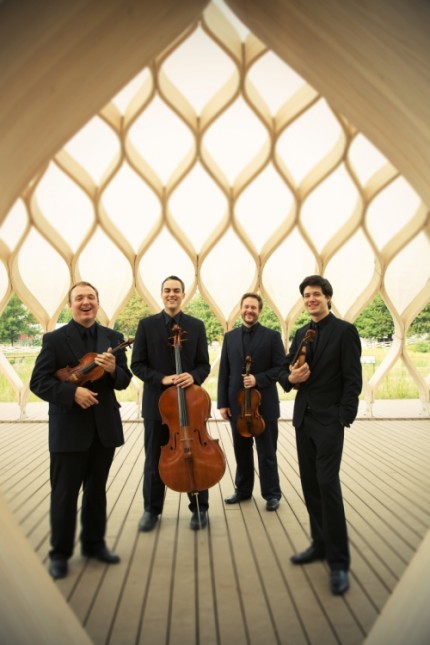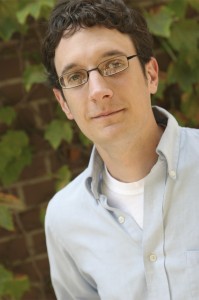Spektral Quartet brings full-metal intensity to Empty Bottle

Chicago is not a city lacking in chamber ensembles but there’s always room for more, particularly one that can bring in a new audience.
The Spektral Quartet is the latest addition to the local music scene. The four young men that comprise the string quartet are familiar faces in Chicago’s new-music groups, and, in the second concert of the quartet’s debut season Wednesday night, they showed themselves superb musicians with a close rapport and assured technical polish.
The Spektral Quartet is clearly trying to attract a new, younger crowd to classical music, as was clear by their presentation and venue, performing at The Empty Bottle rock lounge on north Western.
Not everything worked Wednesday night. But the most important element, the quality of the music-making was consistently impressive.
And from an audience standpoint , the concert was a resounding success with a crowd of about 150 packed into the small club. Even allowing for a large contingent of friends and relatives, it was clear the event drew a non-traditional classical crowd—younger and artsier—who listened with great attentiveness throughout the program.
Hugo Wolf’s Italian Serenade made a worthy calling card for the program titled “Embark,” starting the journey from Italy (via Austria), to England and Bohemia. (The exceedingly clever vintage cruise admission ticket was a nice touch.)
Even in the mercilessly dry room, the four musicians—violinists Aurelien Fort Pederzoli and J. Austin Wulliman, violist Doyle Armbrust and cellist Russell Rolen—acquitted themselves very well with a lean, well-blended ensemble and easy give-and-take in Wolf’s superficially sunny musical postcard, led by some nimble first violin work by Pederzoli.
Like the Emerson String Quartet, the Spektral fiddlers switch chairs for alternating works and Wulliman was the leader for Thomas Adès’ Arcadiana.
Written at age 21, Arcadiana served notice of the brilliant young Brit as one of the most distinctive composers of his generation. Cast in seven short movements, the quartet takes inspiration and thematic threads from Mozart, Schubert, Piazzolla and Elgar. While such a scheme could become a pastiche in lesser hands, Adès morphs these melodic strands into his own bold, edgy and startlingly original voice.
This is extraordinarily difficult and challenging music, yet the Spektral musicians emerged with colors flying. The opening section with its disoriented shadowy memories of Venice could have been more hushed and concentrated, but the playing in the ensuing sections was superb across the board.
The ephemeral Magic Flute echoes in the second movement and the mercurial alternation between pizzicato and bowed fragments in the third section were dispatched with skill, and the musicians deftly underlined the malign edge to the murky rhythms of the central tango mortale.
Adès draws on Elgar’s Nimrod for the penultimate section (O Albion), and here puts aside his wryly ironic style for a sincere, quite beautiful lyric meditation, rendered with the greatest sensitivity and dynamic nuance by the Spektral musicians. The highlight of the concluding Lethe movement was Rolen’s burnished cello solo, all four players drawing down the wistful coda to a barely audible filagree, apart from the clinking of bottles and the ceaseless sound of Mammon from the bar’s cash register.
Bedrich Smetana’s String Quartet No. 1, subtitled From My Life, still sounds startlingly fresh and modern 135 years after it was written, with a jarring mix of Czech folk material, rhapsodic lyricism, and sudden acute tragedy reflecting the composer’s despair at his growing deafness.
The Smetana quartet received the finest playing of the evening, with Armbrust’s firmly focused viola line strongly evoking the rustic folk element. All the players conveyed the originality and richness of this work from the foreboding at the first-movement coda, to the swing and folk accents of the second section, and the impassioned lyricism of the Largo, inspired by Smetana’s beloved wife.
Pederzoli’s climactic high E on the first violin—representing Smetana’s tinnitus and encroaching deafness—needed to be more piercing but otherwise the playing by all four in the finale was inspired, skillfully negotiating the tricky transition from joyous folk dance to bleak tragedy, closing with a rarefied pianissimo.
Somewhat less successful was the evening’s extra-musical component presented by writer and storyteller JC Aevaliotis.

Clearly this was part of the group’s attempt to make this a “different” experience. The evening opened with Aevaliotis’s original tale—a spoken narrative that had something to do with how the protagonist came to be wearing the clothes of his ex-girlfriend’s deceased father. There were some amusing moments and the whole spoken word-music hybrid in the club milieu places the program in the revered music-and-poetry Beat coffeehouse tradition.
Yet while Aevaliotis is an admirable clear-voiced storyteller, there was little real connection or relevance to the music. Plus having the evening open with a 20-minute spoken narrative was likely too much of an okay thing for those who came primarily to hear the music.
As a host, Aevaliotis’s wry introductions of the group and the works captured more of the off-center informality the quartet was clearly striving for in their presentation. But breaking up the Smetana quartet by having Aevaliotis introduce each movement was a jarring distraction and diluted the continuity and forward momentum of the musicians’ fine performance.
Posted in Uncategorized




